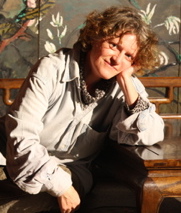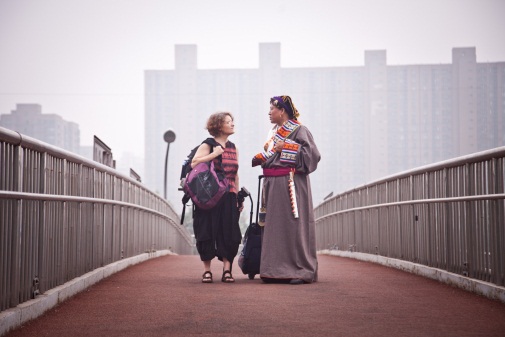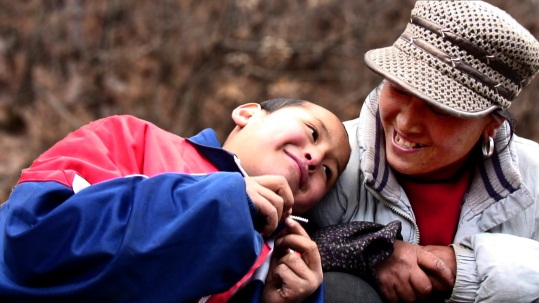|

|
|
Jocelyn Ford
Filmmaker & Freelance Multimedia Journalist
|
I met director and Beijing-based journalist Jocelyn Ford in Brussels during the world premiere of her film at the “Millennium Film Festival” (1) and I decided to interview her. She caught my attention because of her curiosity and her great sense of humanity.
<<Nowhere to call home: A Tibetan in Beijing>> (2) is your first documentary, selected from amongst 800 films for the Millennium Film Festival in Brussels. The film talks about the life of a Tibetan mountain woman whose husband dies, leading her to become a street vendor in
Beijing to support her young son. It addresses gender discrimination in her community.
You've lived in Beijing since 2001, what inspired you to make this film?
One of the frustrations for foreign correspondents working in China is the government’s near-ban on reporting in Tibetan regions. At the time I thought the world hears about Tibetans in exile, Buddhist Lamas and literate Tibetans, but outsiders hear very little about the rural majority, such as Tibetans with little education who grew up in remote areas of the People’s Republic of China.
But there are quite a few Tibetans selling jewelry on the streets of Beijing, so one evening I sat down to talk with one. The more I learned about Zanta’s life, the more urgent I felt it was to tell her story. It soon became apparent that the outside world is largely ignorant of the daily concerns of people like Zanta. I thought if people are truly interested in the welll-being of Tibetans, they first need to have a better understanding of what their lives are like. And though I can’t say Zanta is representative of all Tibetans -Tibet is a vast area the size of Western Europe with many different cultures and traditions - at least Zanta represents a different voice that has yet to be heard. There are many like Zanta’s father-in-law, who don’t think education is important. I was astonished to learn the illiteracy rate in Tibet is something like 45%. I was shocked to learn that out of the four girls in Zanta’s family, three had attempted suicide. Suicide attempts among women in her village are extraordinarily common. This speaks of the suffering and low value placed on women, as indicated by a Tibetan word for woman, “inferior birth.”
Zanta is the main character in your documentary. Is there anything in Zanta’s life that inspired you? Why did you choose Zanta and not another Tibetan woman?
|

|
|
“Nowhere to Call Home: A Tibetan in Beijing”
|
Why Zanta? Serendipity is the answer. I’d long been curious why so many Tibetans came to Beijing to peddle jewelry on the streets. The night I decided to stop and chat with the Tibetan street vendors I happened to choose Zanta.
Had I stopped to talk to someone else, I doubt there would’ve been a film. Had Zanta not been such a remarkable person, with a remarkable and inspirational story I would not have pursued this story. Zanta simply refuses to give up, even when the odds are stacked high against her. Zanta is an impressive and determined person. She is feisty, principled, smart, passionate, compassionate and has a strong sense of justice. She is no angel - you can see this in the film - but she is a role model. One man after watching the film said “never underestimate what women can do”. A number of women who joined my test screenings said afterseeing the film, their own troubles were easier to manage. To tell you the truth, in my decades of reporting I have rarely met someone with Zanta’s qualities. Her charisma and life experience speak to people from rich and poor countries, and from all walks of life. And to think, had her husband not fallen tragically ill, the world would not have benefited from what she has to offer.
You are a journalist and a film maker. What inspired you to pursue a career in filmmaking?
Ha! I’ll have to give the same answer as the last question: serendipity! At the end of the day, I’m interested in people. I’m interested in doing my little bit to leave the world a better place. If I’d been a patient person, I might’ve become a school teacher. I think teaching little kids is one of the most important jobs in the world. But I’m a nosy person who likes adventure. I have a simple belief: if people are better informed they will make better decisions. So, I chose journalism, a form of storytelling. In fact, I never “decided” to become a filmmaker. A friend - my producer Wu Hao - insisted I make a film, and offered to give me all the support I would need to do so. How could I turn down an offer like that? During filming I was in way over my head, and needing far more support than my producer had signed up for. But by the time I ran into these difficulties I had decided the story was too important to abandon. I simply needed to do my best. So, that’s how I became a filmmaker.
You seem to have lived most of your life in Asian countries. You went to Japan right after graduating from college and stayed almost 20 years, then moved to China. How is it for a young western woman living in these countries, with cultures that are still quite unknown by the western world?
I faced a lot of culture shock while living in these countries. For example, when I arrived in Japan I didn’t know how important nonverbal communication is. Japanese try to avoid confrontation and don’t like to say “no.” I learned this through misunderstandings and I fear by being rude. But I was there so long I internalized indirect communication, and now find it difficult to be straightforward! Sometimes I want to tell people I may look American, but beware of misinterpreting me because some of my behavior is closer to Japanese!
However, as a white woman in Japan, I was treated better than my Japanese female colleagues. As an outsider, the expectations for Japanese women did not apply to me. In fact, I probably had more freedom than I would have had in the US, where I’d feel more pressure to live up to societal norms. I did, however, face a delicate balancing act of maintaining values that are dear to me while adopting enough Japanese etiquette to make those around me feel comfortable. Some of my values ran counter to Japanese expectations. For example, I’m the type who will shout out “The Emperor is wearing no clothes!” or who will point out injustices. In Japan, maintaining face and smooth social relations is more important than standing up for principles, because doing so might cause friction. But I think, at the end of the day, since I was well-intentioned I was appreciated and accepted for who I was.
You were the first foreign female journalist working in the Japanese Prime Minister's press club. Did you experience any cultural prohibitions or any discrimination in your working environment, as a woman and a westerner?
I was not only the first foreign woman; I was the first foreign reporter of any gender to be assigned by Japan’s Kyodo News Agency to cover the press club in the Japanese Prime Minister’s office. Essentially, every day I went to work in the Japanese equivalent of the White House.
Japan is quite a conservative and insular country that is wary of outsiders. At the time, around 1990, there were only about five women among the 100 or so reporters. Few of my Japanese colleagues dared to ask questions that would embarrass the political leadership, or that the leaders didn’t want to answer.
In the beginning, I planned to lie low at press conferences. But there was a big news story just before my very first press conference. The U.S. invaded Panama. Japan is an ally of the U.S. so I thought someone should ask what Japan’s position on the invasion was. But no one did, so I opened my mouth. Much to my surprise, after the conference was over one of my Kyodo News colleagues ran up to me and told me that some reporters thought I shouldn’t be asking questions at all! I was surprised, because asking questions is our job! But in fact, my ideas about the role of journalists were very much influenced by my cultural background.
What about discrimination as a woman?
First and foremost I was a foreigner. Being female was secondary. In certain ways when trying to break the ice in a different culture, being a woman can be an advantage. I think because I am small - even shorter than most Japanese women - I was less threatening to Japanese men than a big Caucasian man would’ve been. I was comfortable behaving like a Japanese woman was expected to behave - for example pouring drinks for men or letting them enter an elevator first - but I was also comfortable speaking out when I needed to.
How is the condition for women in Japan and China? What is the influence of women in these societies?
In Japan women control the budget and the household. They wield some decision-making power inside the home. But men and women are expected to play different roles in society. Women don’t have the same opportunities or influence as men.
When I was a teenager I declared I was a humanist. I’m interested in the well-being of all humans regardless of gender. I thought my mother’s generation had paved the way for me to be myself, rather than be restricted by societal expectations for people of my gender. Alas, I was wrong. After arriving in Japan (aged 21) I realized that until women enjoyed the same social status as men, I needed to be a “feminist.” I felt responsible for asserting that women should be able to follow the path of their choosing, and not be restricted to the narrow path society imposes on them. (I think men should be demanding similar freedoms from restrictive social expectations, but that’s another story).
|

|
|
“Nowhere to Call Home: A Tibetan in Beijing”
|
With my film about Tibet, I feel I’m traversing similar territory. The Tibetan word for woman “inferior birth” is a smoking gun for serious underlying discriminatory attitudes. But there is inadequate research or attention to gender issues in Tibet. My research thus far, suggests treatment of women varies from place to place, but there are areas with very serious problems. Zanta says in her village of about 50, almost every family with girls has had at least one suicide attempt, usually due to abuse by the parents-in-law. She thinks women in her village are treated much better than Tibetan women in another province she visited. I think everyone should ask how Tibet attained the image of a peace-loving people if abuse of women is so rife. How did the rest of the world miss this?
I was disturbed that the foreign “Tibet experts” I met expressed little concern about gender injustices. Some suggested there are “more important” issues, namely China’s repression of Tibet. There is pressure among Tibetans to sweep social problems under the rug. In my view, both issues are important and need addressing.
Do you feel that your own culture and traditions during these years have been more of an advantage or an obstacle for your career?
I suppose short-term obstacle, long-term benefit. I’ve never been conventionally ambitious. I don’t like adapting to the group mindset and internal politics and competition that exist in pretty much every organization. So I suppose you could say I’ve opted out of working within large powerful organizations. This poses its own challenges. Essentially, I’ve had to create my own job. I doubt any media organization would’ve thought my film was important enough to dedicate the resources needed to make it. The fact is, it’s harder to get recognition when you don’t have a brand name behind you. So, after embarking on this film project I downsized my life and largely lived off my savings. Hopefully I will be able to turn this around now that I have a film that has social impact.
If a young woman asked you whether to pursue a career as a journalist, what would you tell her?
I would first ask what kind of journalism? If they want to do social impact journalism, they should ask themselves a series of questions. Do they have empathy? Do people open up to them? Can they tell the difference between what they think they know and what they really know? Are they patient and willing to work long hours in pursuit of great stories and factual information? Are they skeptical? Do they know how to tell a good story in a style their audience would enjoy? Do they want to do something they believe in? Or is a good income and security more important? Are they willing to take risks? Are they willing to stand up to editors and bosses to defend a good story? Are they good at working both independently, and in groups? Do they like social media and can they do self-promotion? Do they excel at writing, photography or video, audio, drawing, infographics, or any or all of these? I know that sounds like a lot. They don’t need to have it all. I think the most important ingredient is strong conviction and a desire to pursue this career. Finally, they need to be ready for change. Technology and tastes are changing rapidly, so the way we tell stories is changing. Those who refuse to change will get left behind.
What are your life goals and guiding principles?
I like “integrity” and “honesty.” I would like to be a wise (and happy and healthy!) old lady. I would like to make a positive impact on society and individuals. I don't want to be penniless or destitute on the streets when I die. But I don't want to have too much either. After you die, I don’t think many people will remember what was in your bank account; but they might remember the stories you told, how you changed their thinking, or the joy you brought them. Naturally, making an independent documentary on a shoestring budget is a tremendously helpful step toward reaching this goal of a near-empty bank account. On a more serious note, I’ll simply say my experience in life is my wealth.
What are the words or awards which you are most proud of?
I’ve won a number of media awards and fellowships, but to be honest, I’m a bit skeptical about some of these. Awards are often big business - organizations collect fees from the applicants. Often the accolades go to people with connections, or who have a brand name behind them.
Having said that, I’m proud that my film is premiering at the Museum of Modern Art in New York and that it has been translated into six languages. I am an independent first-time filmmaker, and I don’t have any connections in the film world. So I feel my work is being recognized for its merits. I’m proud that I’ve made a film on a politically volatile subject that can be seen as a human story, and can be a catalyst for constructive discussion on how to make our world a better place for all, regardless of ethnicity or gender.
What are your dreams?
When I started filming, I thought I would never be able to show my documentary in China. My dream is to make a small contribution toward raising awareness about discrimination of all sorts, especially ethnic and gender discrimination. In China, I’d like to promote ethnic tolerance and inspire deeper thinking about the roots of discrimination, as well as how to eradicate it. I think young people in China are ready for this.
.png)
.png)